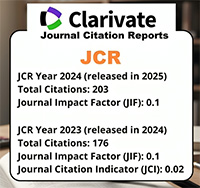Changes in chloremia, secondary to hydric reanimation during the first 24 hours, increases hospital stay and complications in patients with acute pancreatitis.
Cambios en la cloremia secundaria a la reanimación hídrica, en las primeras 24 horas, incrementa la estancia hospitalaria y las complicaciones en los pacientes con pancreatitis aguda.
Abstract
Acute pancreatitis (AP) requires first-line treatment with intensive fluid resuscitation. Hydroelectrolyte changes secondary to this management could be related to an increase in hospital stay, complications, and mortality. The objective of this study was to correlate the increase in serum chlorine (> 8mEq / L) during the first 24 hours (ISC) with a longer hospital stay, complications and mortality in patients with AP. A total of 110 patients with AP admitted to the emergency room were included. Fluid management and serum chlorine were recorded on admission and after 24 hours; duration of hospital stay, complications and mortality, were also registered. 37 patients had ISC (age 56.4 ± 18.4 years; 51% women), there were no differences in age, sex or type of fluid management with patients without ISC. In bivariate analysis, ISC was associated with severe AP (30% vs 12%, p = 0.02), higher APACHE II score at admission (8 [6-15] vs 6 [4-9] points, p = 0.006), and longer hospital stay (9 [7-12] vs 7 [5-10] days, p = 0.03). The overall mortality and complications rate were 16% and 25%, respectively, with no differences between the groups (24% vs. 12%, p = 0.1 and 35% vs. 19%, p = 0.06). After multivariate adjustment, independent predictors of hospital stay were ISC> 8 mEq / L (p= 0.01) and APACHE II scores at 24 hours (p = 0.02). We conclude that ISC is associated with a longer hospital stay in patients with AP from a second-level hospital care population.
Downloads
References
Greenberg JA, Hsu J, Bawazeer M, Marshall J, Friedrich JO, Nathens A, Coburn N, May GR, Pearsall E, McLeod RS. Clinical practice guideline: management of acute pancreatitis. Can J Surg 2016;59(2):128-140.
Petrov MS, Yadav D. Global epidemiology and holistic prevention of pancreatitis. Nat Rev Gastroenterol Hepatol 2019;16(3):175- 184.
Zheng Z, Ding Y-X, Qu Y-X, Cao F, Li F. A narrative review of the mechanism of acute pancreatitis and recent advances in its clinical management. Am J Transl Res 2021;13(3):833-852.
Lipinski M, Rydzewska-Rosolowska A, Rydzewski A, Rydzewska G. Fluid resuscitation in acute pancreatitis: Normal saline or lactated Ringer’s solution? World J Gastroenterol 2015;21(31):9367-9372.
Vedantam S, Tehami N, de-Madaria E, Barkin JA, Amin S. Lactated Ringers does not reduce SIRS in acute pancreatitis compared to normal saline: an updated meta-analysis. Dig Dis Sci 2021; Jul 30. doi: 10.1007/ s10620-021-07153-5
Lipinski M. Fluid resuscitation in acute pancreatitis: Normal saline or lactated Ringer’s solution? World J Gastroenterol. 2015;21(31):9367.
Shaw AD, Raghunathan K, Peyerl FW, Munson SH, Paluszkiewicz SM, Schermer CR. Association between intravenous chloride load during resuscitation and in-hospital mortality among patients with SIRS. Intensive Care Med 2014;40(12):1897-1905.
Lee JY, Hong TH, Lee KW, Jung MJ, Lee JG, Lee SH. Hyperchloremia is associated with 30-day mortality in major trauma patients: a retrospective observational study. Scand J Trauma Resusc Emerg Med 2016;24(1):117.
Marttinen M, Wilkman E, Petäjä L, Suojaranta-Ylinen R, Pettilä V, Vaara ST. Association of plasma chloride values with acute kidney injury in the critically ill - a prospective observational study. Acta Anaesthesiol Scand 2016;60(6):790-799.
Neyra JA, Canepa-Escaro F, Li X, Manllo J, Adams-Huet B, Yee J, Yessayan L, Acute Kidney Injury in Critical Illness Study Group. Association of hyperchloremia with hospital mortality in critically ill septic patients. Crit Care Med 2015;43(9):1938- 1944.
Kümpers P. Volumen substitution mit NaCl 0,9%: Segen oder Fluch? Internist 2015;56(7):773-778.
Mao W, Wu J, Zhang H, Zhou J, Ye B, Li G, Gao L, Li X, Ke L, Tong Z, Li W, Li J. Increase in serum chloride and chloride exposure are associated with acute kidney injury in moderately severe and severe acute pancreatitis patients. Pancreatol Off J Int Assoc Pancreatol IAP Al 2019;19(1):136-142.
Vincent J-L, De Backer D. Saline versus balanced solutions: are clinical trials comparing two crystalloid solutions really needed? Crit Care 2016;20(1):250.
Barquera S, Campos-Nonato I, Hernández- Barrera L, Pedroza A, Rivera-Dommarco JA. Prevalence of obesity in Mexican adults 2000-2012. Salud Publica Mex 2013;55 (Suppl 2):S151-160.





















